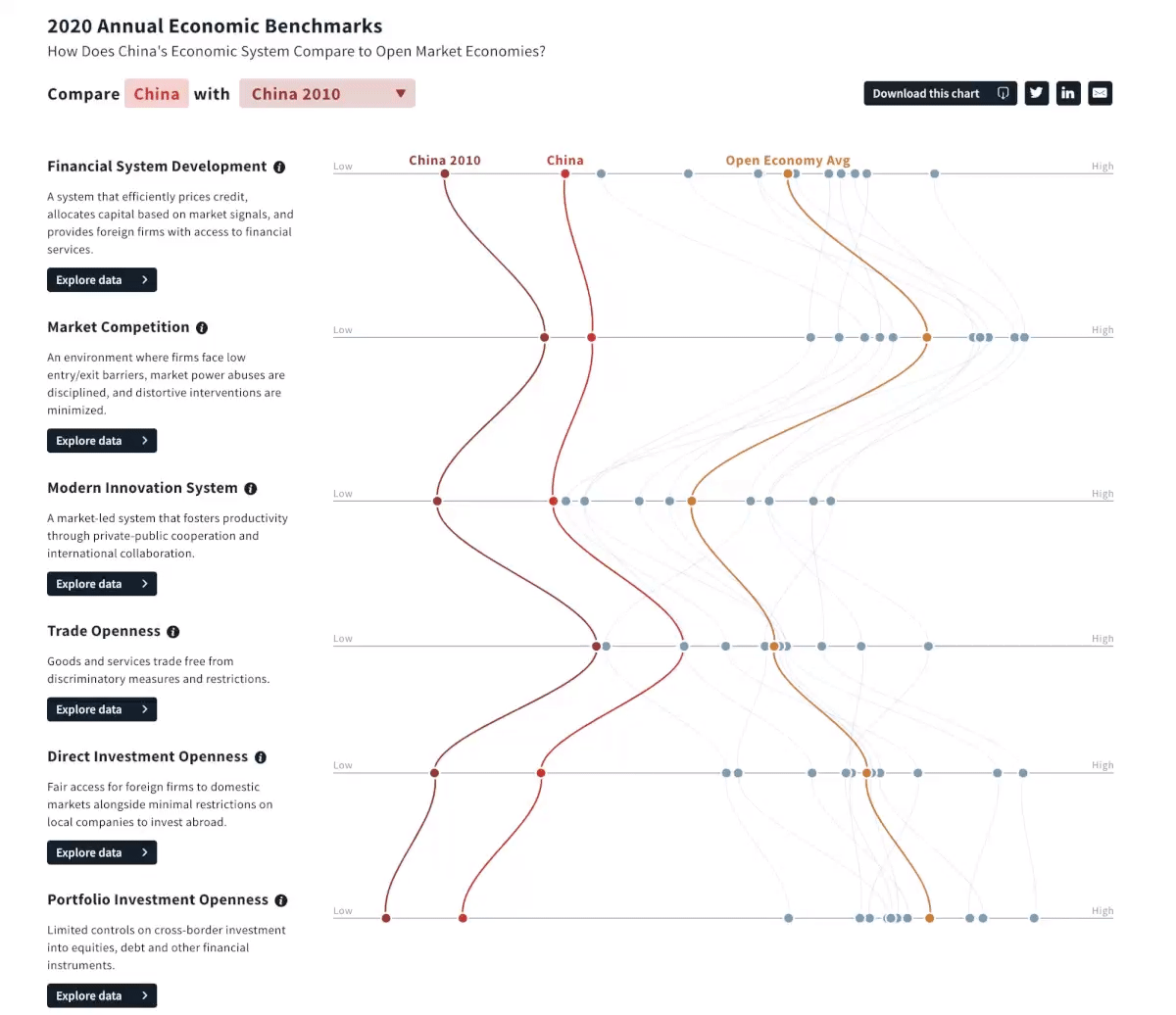Welcome to the 87th edition of Trade War. China sends an unprecedentedly high number of PLA flights into Taiwan’s air defense zone while close business and investment relations between the two sides complicate growing tensions.
Beijing commission issues statement considering ban on all private organizations doing news gathering while foreign businesses mull over what Common Prosperity means for their industries.
U.S. Trade Representative Katherine Tai meets virtually with counterpart Liu He to discuss trade and tariff frictions while global financial firms continue to bet on making money in China.
China’s onslaught of military flights near Taiwan
For starters, here is a five minute-plus explainer from yours truly on what China’s onslaught of military flights near Taiwan mean for China, Taiwan, and the U.S. You can watch it here.
And for a good read on how “enormous flows of trade, investment and critical technology also link the two countries” and that “could either put a brake on Beijing’s “reunification” ambitions, or provide an alternative weapon to fulfill them” I recommend reading this piece by Barron’s Craig Mellow.


Ban on private money in news rooms?
China has floated the possibility of banning private capital from the news business, report Bloomberg News’ Bei Hu and Coco Liu.
According to a public consultation paper published by the National Development and Reform Commission, China’s top planning organization, private capital would be “barred from news gathering and distribution operations” as would “[reproducing] news content generated by foreign media,” writes the financial news service.
“While it wasn’t immediately clear whether the proposed restrictions unveiled Friday are fresh curbs or incremental rules designed to close loopholes that private investors had exploited, they do signal regulators’ intent to step up enforcement.”


Is this regulation something new?
And here is an interesting thread from Liqian Ren, director of Modern Alpha, on the possible ban’s significance which considers two key questions: what companies might be affected and is this regulation something new?

How Common Prosperity might effect business
Xi’s new focus on ‘Common Prosperity’ will affect where foreign business can make money in China, writes the BBC’s Karishma Vaswani.
“One of the most visible consequences of common prosperity has been the refocusing of corporate China's priorities to the domestic market,” writes Vaswani.
“Technology giant Alibaba, which in recent years has seen its global profile rise, has now committed $15.5 billion to help promote common prosperity initiatives in China, and set up a dedicated task force, spearheaded by its boss Daniel Zhang.” Meanwhile, rival Tencent has pledged to spend $7.75 billion.
The new focus on growing the middle class could help the bottom lines of global businesses, reports the BBC.
"If [young people] feel they are part of social mobility in this country, which has been eroding, then it is good for us. Because when the middle class grows, then there is more opportunity," Joerg Wuttke, president of the EU Chamber of Commerce in China, told the BBC.
But ‘Common Prosperity’ could hurt global luxury consumption, 50 percent of which comes from Chinese consumers, warns Wuttke. “If China's rich decide to buy less Swiss watches, Italian ties and European luxury cars then this industry will take a hit."


Common Prosperity luxury picks
Foreign luxury brands are already mulling how to tone down their opulent offerings, reports Bloomberg News.
“Common prosperity—the policy directive du jour of President Xi Jinping—won’t banish luxury goods from Chinese malls. But it will usher in a new era where watches are encrusted with fewer diamonds and logos no longer embellish jackets and jewelry,” predicts the financial news service.
“Luxury is likely to be characterized by more subtle designs, with fewer ostentatious details,” reports Bloomberg.
“We could see a return to the mood that engulfed China almost a decade ago, amid a crackdown on corruption, when consumers didn’t want to make their consumption too conspicuous. Products like watches and high-end alcohol were collateral damage.”
Meanwhile, if ‘Common Prosperity’ does succeed in growing the middle class, “that could drive demand for entry-level handbags, costing around $1,000, rather than those made from exotic skins costing at least 10 times more.”
For foreign brands, the biggest potential blow would be if Chinese shoppers started to prefer local brands over global giants. “Handbags are likely to remain the preserve of the European houses. But local players such as Cindy Chao are gaining traction in jewelry,” says Bloomberg.


Past performance doesn’t equal future results
Even as Beijing’s crackdowns on private business spook Chinese entrepreneurs and governments abroad increasingly fear the country’s assertive rise, Wall Street only seems more bullish on China, writes the New York Times’ Li Yuan.
“BlackRock, the world’s biggest asset manager, urged investors to increase their exposure to China by as much as three times,” writes Li Yuan. “Is China investable?” asked J.P. Morgan, before answering, “We think so.” Goldman Sachs says “yes,” too.”
That’s hardly surprising: while Beijing clamps down on its own business and economy, it is expanding opportunities for foreign investment firms working with Chinese companies.
“At the height of a market sell-off in late July, the deputy chairman of China’s securities regulator, Fang Xinghai, summoned executives of BlackRock, Goldman Sachs and other firms to a meeting, trying to alleviate investor nervousness over Beijing’s crackdowns, according to a memo I reviewed,” reports the Times. Less than a month later China gave the green light to BlackRock to offer mutual funds.
“I don’t think we can use spreadsheet-type thinking to take a view on China in the 2020s and beyond,” George Magnus, a China researcher at Oxford University and former chief economist for UBS told the paper. China is undergoing “a sharp leftward lurch in politics which is creating a deep contradiction between the craving for political control and the desire for good economic and innovation outcomes.”
“The Wall Street firms are apparently betting that China’s past successes will continue,” notes Li Yuan. “They have a long track record on their side, but they would do well to remember what they constantly tell their customers: Past performance isn’t necessarily indicative of future results.”


China for the long term?
"If you go to China with a medium or short term approach for the next two quarters—you are in the wrong place. You have to go to China for the long term," HSBC’s Nuno Matos said on Bloomberg Television. China’s middle-class and high net worth population are growing by nine percent annually, according to the chief executive of HSBC Wealth and Personal Banking.
“When I was a smart-alecky young Wall Street bond trader we used to joke that whenever a trade made money it was part of the trading book, but whenever a trade lost money it didn't count because it was part of the long-term investment book,” tweets Peking University finance professor Michael Pettis, responding to Matos’ comment.


Demography to hit wasteful property investment
With its population quickly aging and China already 60 percent urbanized, its property boom is sure to end, writes the Financial Times’ Martin Wolf.
“How serious a threat to the Chinese economy might the difficulties of Evergrande, the world’s most heavily indebted property company, and now Fantasia, become?,” writes Wolf. “The answer is not that China will experience a devastating financial crisis. It is rather that the economy’s dependence on demand from investment in real estate must end.”
China’s investment which averaged around 38 percent of economic output from the decade lasting from 2000 to 2010, actually has gone up to 43 percent from 2010 to 2019, reports the financial paper. As overall growth has fallen, this means China’s return on investment have also fallen significantly.
While this is reflected in China’s growing debt problem, it also shows investment is being wasted, with much of that misspending happening in China’s inflated real estate sector. “Xi Jinping himself has spoken of the need to shift “to pursuing genuine rather than inflated GDP growth”. This has to be a big part of what he meant,” writes Wolf.
“This combination of high and unproductive investment with soaring debt is closely related to the size and rapid growth of the property sector. A 2020 paper by Kenneth Rogoff and Yuanchen Yang argues that China’s property sector contributed 29 per cent of GDP in 2016,” notes Wolf.
“Among high-income economies, only pre-2009 Spain matched this level. Moreover, almost 80 per cent of this impact came from investment, while about a third of China’s exceptionally high investment has been in property.”


USTR: China’s ‘authoritarian state-centric approach’
U.S. Trade Representative Katherine Tai met virtually with counterpart Liu He to discuss trade and tariff frictions, reports Reuters.
“Beijing is increasingly explicit that it is doubling down on its authoritarian state-centric approach and is resistant to addressing our structural concerns," a USTR official said in a briefing before the meeting.
"The Chinese side negotiated over the cancellation of tariffs and sanctions, and clarified its position on China's economic development model and industrial policies," Xinhua, China's official news agency reported after the talks.


Notable/In Depth
Here is the first tweet from Canadian Michael Kovrig, recently released from more than 1,000 days in a Chinese prison.
How does China’s economic system compare to the world’s largest open market economies? Check out the Atlantic Council GeoEconomic Center’s new China Pathfinder.


China’s property developers facing selloff, report Bloomberg News’ Sophia Horta e Costa and Rebecca Choong Wilkins.

"For Chinese foreign policy officials, the safest course is to follow Xi’s lead and to add a little extra zeal for good measure," writes Bloomberg News’ Peter Martin in Foreign Affairs, commenting on the “more assertive, less flexible" approach in China’s foreign policy.


Upcoming book talk
Don’t miss the upcoming talk at the Mansfield Center by Peter Martin on his new book China's Civilian Army: The Making of Wolf Warrior Diplomacy. You can register here.


Fall day in the mountains
And another glorious fall day in the mountains.




